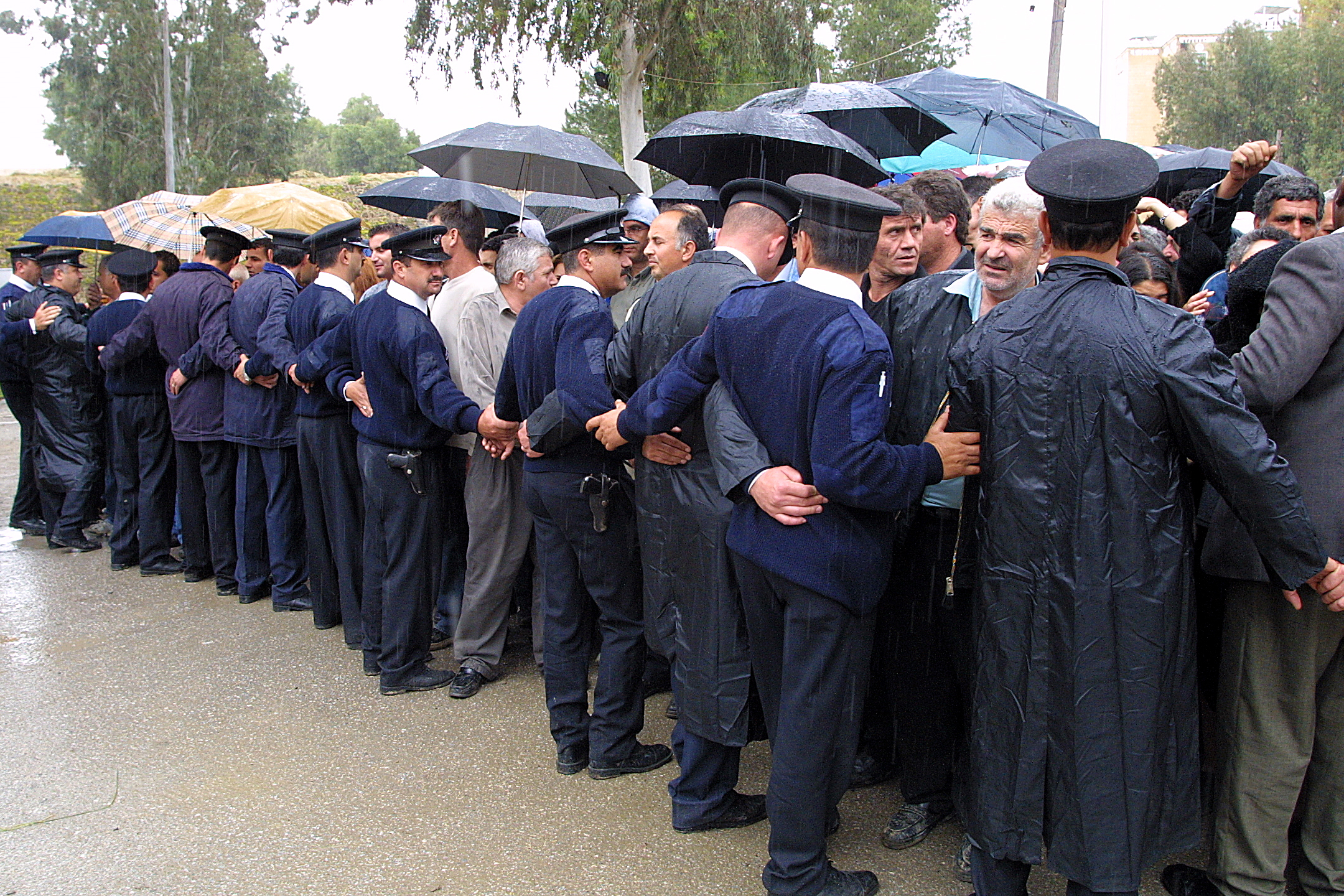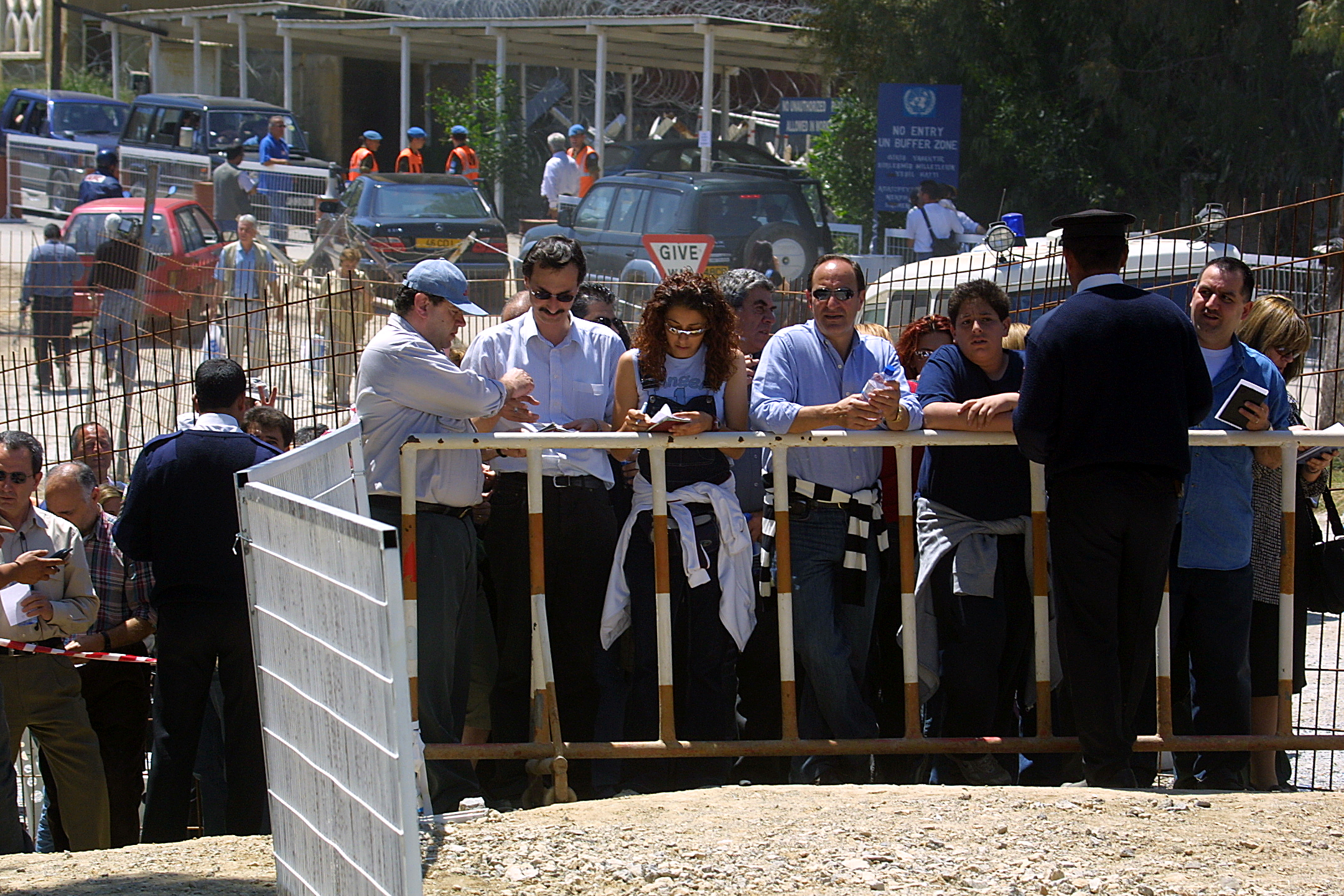Hundreds of Greek and Turkish Cypriots gathered at either end of the newly-paved road linking the two sides, waiting patiently for the police cordons to be taken away.
But they had to wait for the close of the ceremony taking place inside the 80-metre stretch of UN-controlled buffer zone, where officials, diplomats and media jostled for space.
The opening was officially marked with the release of dozens of coloured balloons, followed by cheering from both ends of the road.
During the ceremony, Presidential Commissioner George Iacovou, who was instrumental in speeding up the opening with Ozdil Nami, the adviser to Turkish Cypriot leader Mehmet Ali Talat, called it an important and auspicious occasion.
“We want it to be auspicious because we aspire to the elimination of crossings and to the opening of all roads in this country for all its citizens with no obstructions, as a consequence of its reunification,” Iacovou said.

Referring to the possible new Cyprus negotiations, he pledged to work towards a settlement as soon as possible.
“It has not been an easy road… in fact I could say it has been a difficult road to this happy celebratory occasion. But we have overcome [the obstacles] and I hope that we can overcome all the difficulties that we face in the process of finding a solution to the problem of Cyprus that would lead to the reunification of the country and its people,” he added.
Nami said the day was historic.
“We are witnessing the overthrow of one of the obstacles for the reunification of the island. Almost half a century of division has been symbolised here,” he said.
“I think it’s symbolic in the fact that we are now in a new era. A new process has started. It started in a very positive mood. This is a continuation of that positive mood. It also symbolises for me that when Turkish Cypriots and Greek Cypriots can overcome their fears, when they have good will and when they start to build trust with one another they can overcome long standing disputes and arguments. We are now at a new age, a new understanding and we have to make use of it.”
Nami said it was not only important for “us Cypriots” but that the world was also watching, “and watching closely” how the people of Cyprus were going to manage their conflict, which could give sense of hope for other conflicts around the world.
He also said that without the vision and political will of the two Cypriot leaders, the opening could not have happened.
The Greek Cypriot and Turkish Cypriot Mayors, Eleni Mavrou and Cemal Bulutoglulari, also gave short speeches.
Bulutoglulari said that over the years it was the determination a string of mayors that kept pushing the politicians to open Ledra Street.
“We said we will open this gate without politicians and force it till we get the solution,” he said. “Today this had happened.”
It was Mavrou who delivered the most eloquent and moving address of all of the speakers yesterday.
“No barricade symbolises so strongly the island’s division and decades of failed reunification attempts as much as this one, Ledra Street,” she said.
“It could be the fact that historically this road reflected the tensions and conflicts between the two communities and at the same time their co-operation and friendship. It could be the fact that it runs through the heart of the capital of Cyprus. It could be the fact that while life goes on in both sides, these 70 metres remained frozen in time with the bullet-scarred derelict buildings reminding us of the tragedy of this island.”
Mavrou said opening Ledra Street was a much-needed positive step forward that could underpin peace efforts and generated a renewed sense of hope in both communities.
“The road is open but the bullet-pocked derelict buildings around us are a constant reminder that there is still a long way to go until peace prevails and the reunification of the island is achieved,” said Mavrou.
“It remains to be seen whether this road will in the end turn into the avenue that will help reach a solution for all Greek and Turkish Cypriots. There is still a long way to go.”
Mavrou also briefly addressed the crowd in Greek and in Turkish, for which she received loud appreciation.
Former Nicosia Mayor Lellos Demetriades was also at the event. He said he was very pleased and full of optimism. “You cannot solve problems by sitting at the office and thinking all about the negatives. You have to think the positive things too,” he said.
“And the fact that the heart of the city, the real heart of the city now can communicate, that’s a very great thing. Of course, this whole problem has not been solved. Of course, the wall is there, but there are cracks and if you have a enough cracks, then you have no wall.”
Elizabeth Spehar, the acting UN Special Representative in Cyprus, also used the word historic “for the hope it represents with the renewal of the peace process in Cyprus”.
“Historic as tangible evidence that what has appeared impossible for decades is in fact attainable if the will to go forward is there,” she said.
“And historic in its symbolism as the barrier that came to embody the division of this beautiful island finally give way to let all the people of Nicosia come together in the heart of the city.”
Spehar said the UN was aware that the opening of Ledra Street did not mean that the Cyprus problem was resolved and warned that would involve much more work among Cypriots.
“But the opening does give us a glimpse of what is possible when those elements come together,” she said. “There is a new environment in Cyprus, one that has raised many expectations here and around the world. I sincerely hope that today’s historic event will be one of many markers of progress on that road.”
The international community sent words of encouragement. EU Enlargement Commissioner Olli Rehn said: “It shows the two sides on the island are ready to put aside the difficulties of the past and work together to bring a comprehensive settlement and reunification to Cyprus under the aegis of the United Nations.”
British High Commissioner Peter Millett said the opening showed the political will existed to resolve differences. “This shows that it can be done,” he said.
Only one black spot marked yesterday’s event. When Mavrou went to have a coffee with Bulutoglulari on the Greek Cypriot side, two Turkish Cypriot police officers accompanied him right up to the Greek Cypriot police line, which elicited some complaints.
Greek Cypriot officers complained to the UN and asked them ensure that it would not happen again.
